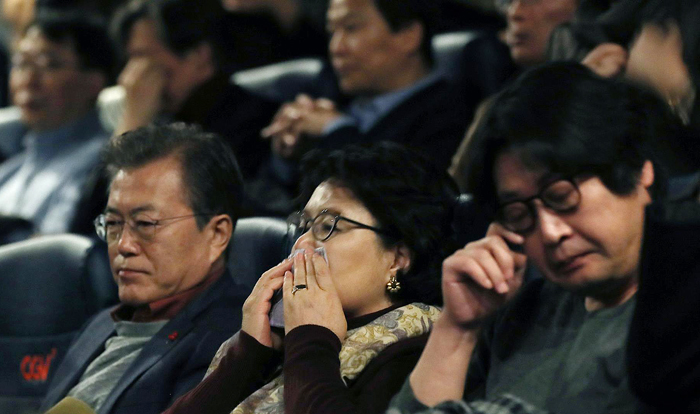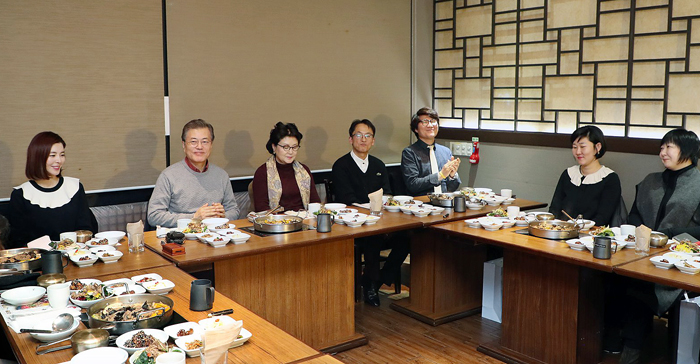
President Moon Jae-in (left) and first lady Kim Jung-sook (center) cry as they watch '1987: When the Day Comes,' based on the torture and subsequent death of university student and democracy fighter Park Jong-chul, at a theater in Yongsan-gu District, Seoul, on Jan. 7.
By Xu Aiying and Sohn JiAe
Photos = Cheong Wa Dae Facebook
President Moon Jae-in and first lady Kim Jung-sook watched “1987: When the Day Comes,” a film about the nation’s historic 1987 democracy movement, in Seoul on Jan. 7.
The movie is centered on the torture and subsequent death of university student Park Jong-chul, who fought for democracy against the Chun Doo-hwan dictatorship. This was part of the spark that started the June Democracy Movement in June 1987.
After watching the movie, President Moon appeared on stage with tears welled up in his eyes, saying, choked up, “How was the movie? You must’ve cried a lot. I cried all throughout the movie, too, and was touched by the story.”
“What struck me most in the film was the question about whether the world would change with the uprising,” said the president. “What plagued the democracy fighters the most in the June Uprising and in previous rigorous struggles for democracy was not just the dictatorship, but also the questions they had to face from their parents and relatives, ‘Do you think the world will really change?’”
President Moon mentioned the people’s struggle under dictatorship, and last winter’s candlelit vigils for democracy, saying that, “Although the world cannot change suddenly, it was the candles held up by the people last winter that completed the regrettably unaccomplished June movement that ended with no regime change.”
“History does not develop quickly. History has evolved slowly, but surely, over the long span of time,” he stressed.

President Moon Jae-in holds talks with artists and others from the entertainment industry who used to be blacklisted by former governments, at a restaurant in Yongsan-gu District, Seoul, on Jan. 7.
President Moon also met with a group of artists and figures from the entertainment industry who had been included on the blacklist under former administrations.
During the meeting, the president stressed that, “Our incumbent government will significantly increase aid for the cultural and arts industries, while sticking with the ‘no-interruption, no-political-bias, and no-discrimination' policy toward those artists and entertainment figures who receive government support.”
xuaiy@korea.kr